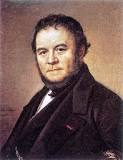The Red and the Black Page #9
Le Rouge et le Noir is a historical psychological novel in two volumes by Stendhal, published in 1830. It chronicles the attempts of a provincial young man to rise socially beyond his modest upbringing through a combination of talent, hard work, deception, and hypocrisy.
Julien possessed both a fiery soul and one of those astonishing memories which are so often combined with stupidity. In order to win over the old curé Chélan, on whose good grace he realized that his future prospects depended, he had learnt by heart the New Testament in Latin. He also knew M. de Maistre's book on The Pope, and believed in one as little as he did in the other. Sorel and his son avoided talking to each other to-day as though by mutual consent. In the evening Julien went to take his theology lesson at the curé's, but he did not consider that it was prudent to say anything to him about the strange proposal which had been made to his father. "It is possibly a trap," he said to himself, "I must pretend that I have forgotten all about it." Early next morning, M. de Rênal had old Sorel summoned to him. He eventually arrived, after keeping M. de Rênal waiting for an hour-and-a-half, and made, as he entered the room, a hundred apologies interspersed with as many bows. After having run the gauntlet of all kinds of objections, Sorel was given to understand that his son would have his meals with the master and mistress of the house, and that he would eat alone in a room with the children on the days when they had company. The more clearly Sorel realized the genuine eagerness of M. the Mayor, the more difficulties he felt inclined to raise. Being moreover full of mistrust and astonishment, he asked to see the room where his son would sleep. It was a big room, quite decently furnished, into which the servants were already engaged in carrying the beds of the three children. This circumstance explained a lot to the old peasant. He asked immediately, with quite an air of assurance, to see the suit which would be given to his son. M. de Rênal opened his desk and took out one hundred francs. "Your son will go to M. Durand, the draper, with this money and will get a complete black suit." "And even supposing I take him away from you," said the peasant, who had suddenly forgotten all his respectful formalities, "will he still keep this black suit?" "Certainly!" "Well," said Sorel, in a drawling voice, "all that remains to do is to agree on just one thing, the money which you will give him." "What!" exclaimed M. de Rênal, indignantly, "we agreed on that yesterday. I shall give him three hundred francs, I think that is a lot, and probably too much." "That is your offer and I do not deny it," said old Sorel, speaking still very slowly; and by a stroke of genius which will only astonish those who do not know the Franche-Comté peasants, he fixed his eyes on M. de Rênal and added, "We shall get better terms elsewhere." The Mayor's face exhibited the utmost consternation at these words. He pulled himself together however and after a cunning conversation of two hours' length, where every single word on both sides was carefully weighed, the subtlety of the peasant scored a victory over the subtlety of the rich man, whose livelihood was not so dependent on his faculty of cunning. All the numerous stipulations which were to regulate Julien's new existence were duly formulated. Not only was his salary fixed at four hundred francs, but they were to be paid in advance on the first of each month. "Very well, I will give him thirty-five francs," said M. de Rênal. "I am quite sure," said the peasant, in a fawning voice, "that a rich, generous man like the M. mayor would go as far as thirty-six francs, to make up a good round sum." "Agreed!" said M. de Rênal, "but let this be final." For the moment his temper gave him a tone of genuine firmness. The peasant saw that it would not do to go any further. Then, on his side, M. de Rênal managed to score. He absolutely refused to give old Sorel, who was very anxious to receive it on behalf of his son, the thirty-six francs for the first month. It had occurred to M. de Rênal that he would have to tell his wife the figure which he had cut throughout these negotiations. "Hand me back the hundred francs which I gave you," he said sharply. "M. Durand owes me something, I will go with your son to see about a black cloth suit." After this manifestation of firmness, Sorel had the prudence to return to his respectful formulas; they took a good quarter of an hour. Finally, seeing that there was nothing more to be gained, he took his leave. He finished his last bow with these words: "I will send my son to the Château." The Mayor's officials called his house by this designation when they wanted to humour him. When he got back to his workshop, it was in vain that Sorel sought his son. Suspicious of what might happen, Julien had gone out in the middle of the night. He wished to place his Cross of the Legion of Honour and his books in a place of safety. He had taken everything to a young wood-merchant named Fouqué, who was a friend of his, and who lived in the high mountain which commands Verrières. "God knows, you damned lazy bones," said his father to him when he re-appeared, "if you will ever be sufficiently honourable to pay me back the price of your board which I have been advancing to you for so many years. Take your rags and clear out to M. the Mayor's." Julien was astonished at not being beaten and hastened to leave. He had scarcely got out of sight of his terrible father when he slackened his pace. He considered that it would assist the rôle played by his hypocrisy to go and say a prayer in the church. The word hypocrisy surprises you? The soul of the peasant had had to go through a great deal before arriving at this horrible word. Julien had seen in the days of his early childhood certain Dragoons of the 6th[1] with long white cloaks and hats covered with long black plumed helmets who were returning from Italy, and tied up their horses to the grilled window of his father's house. The sight had made him mad on the military profession. Later on he had listened with ecstasy to the narrations of the battles of Lodi, Arcola and Rivoli with which the old surgeon-major had regaled him. He observed the ardent gaze which the old man used to direct towards his cross. But when Julien was fourteen years of age they commenced to build a church at Verrières which, in view of the smallness of the town, has some claim to be called magnificent. There were four marble columns in particular, the sight of which impressed Julien. They became celebrated in the district owing to the mortal hate which they raised between the Justice of the Peace and the young vicar who had been sent from Besançon and who passed for a spy of the congregation. The Justice of the Peace was on the point of losing his place, so said the public opinion at any rate. Had he not dared to have a difference with the priest who went every fortnight to Besançon; where he saw, so they said, my Lord the Bishop.
Translation
Translate and read this book in other languages:
Select another language:
- - Select -
- 简体中文 (Chinese - Simplified)
- 繁體中文 (Chinese - Traditional)
- Español (Spanish)
- Esperanto (Esperanto)
- 日本語 (Japanese)
- Português (Portuguese)
- Deutsch (German)
- العربية (Arabic)
- Français (French)
- Русский (Russian)
- ಕನ್ನಡ (Kannada)
- 한국어 (Korean)
- עברית (Hebrew)
- Gaeilge (Irish)
- Українська (Ukrainian)
- اردو (Urdu)
- Magyar (Hungarian)
- मानक हिन्दी (Hindi)
- Indonesia (Indonesian)
- Italiano (Italian)
- தமிழ் (Tamil)
- Türkçe (Turkish)
- తెలుగు (Telugu)
- ภาษาไทย (Thai)
- Tiếng Việt (Vietnamese)
- Čeština (Czech)
- Polski (Polish)
- Bahasa Indonesia (Indonesian)
- Românește (Romanian)
- Nederlands (Dutch)
- Ελληνικά (Greek)
- Latinum (Latin)
- Svenska (Swedish)
- Dansk (Danish)
- Suomi (Finnish)
- فارسی (Persian)
- ייִדיש (Yiddish)
- հայերեն (Armenian)
- Norsk (Norwegian)
- English (English)
Citation
Use the citation below to add this book to your bibliography:
Style:MLAChicagoAPA
"The Red and the Black Books." Literature.com. STANDS4 LLC, 2025. Web. 6 Mar. 2025. <https://www.literature.com/book/the_red_and_the_black_201>.








Discuss this The Red and the Black book with the community:
Report Comment
We're doing our best to make sure our content is useful, accurate and safe.
If by any chance you spot an inappropriate comment while navigating through our website please use this form to let us know, and we'll take care of it shortly.
Attachment
You need to be logged in to favorite.
Log In